



A quick way into the classics

Enter The Story is a quick way to explore classic books. You get inside the story so you can see if you are as brave (or foolish) as the hero. Compare your score with your friends!
Enter the Story will one day include all of Shakespeare, every book of the Bible
(including the apocrypha), the works of Jules Verne, Jane Austen and
much, much more. If you like the quick version you can read the original in just two clicks.
The first five stories are
experimental full length adventure games for Windows. Everything else works on nearly any Internet browser.
The daily story (up to the current chapter) is always free. For other stories you get the first half free. Or download everything for a low price (using Paypal or
any common payment method).

book images: 123rf.com
The best children's stories,
like the Arabian Nights or the original Grimm's Fairy Tales, cover adult
topics. But the stories are told in a very simple way. Enter The Story
is the same. If
you have children, this is an easy way to read to them: just grab a
phone or laptop, settle down together, and argue over the choices.
If there are no updates then my
Internet connection is down. I live in a remote village and sometimes
get power cuts and Internet outages. Usually everything is back to
normal within 24 hours.
Each story stars Sam Everyman.
The first page of each story is about Sam.
Then you click "next" and the classic novel begins!
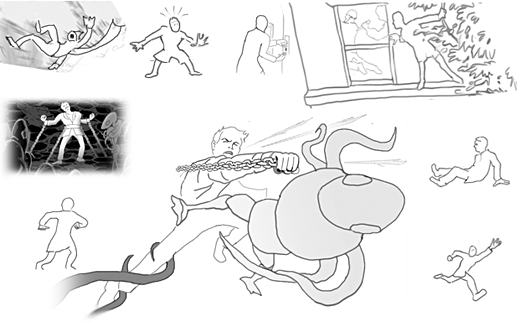
In the original novels Sam has different names, but those are just aliases.
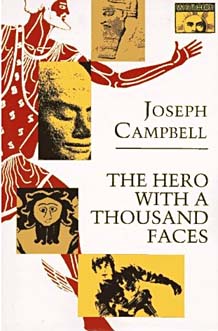
Who is Sam Everyman? How can his adventures take place in different centuries?
The answer is in the original books.
To piece together the clues, start near the end of The First Men In
The Moon.
Try clicking around.
See what happens. You can save your score, then print a certificate, read the entire original book, discover hidden 'Easter
eggs' and more. Most browsers let
you zoom out, using "Ctrl" and "+" - how many cats you can see? Enjoy!
If you have a favorite novel that
is not yet included, it can be added for just $99, and that includes a
dedication to a person of your choice. (The novel must
be an out of copyright classic - anything before 1900 is safe.)
These stories are a quick way to get a story into a person's head, so they're perfect for schools. If you can't find the story you need, contact me (chris at enterthestory dot com) and I'll arrange something.
If
you buy five copies of the complete bundle then consider yourself
licensed for an entire school. The stories have no DRM protection, so
you are free to use them on any computer and keep them
forever.
This format is ideal for training, advertising, or anything that has a message that you want people to actually read. Contact me for prices: chris at enterthestory dot com.
Most of the code is open source. It's very easy to make your own games - why not try it? I will usually host your game on the site for free.
All the profits from this game go toward research to solve the
world's economic problems. Yes, seriously.
My name is Chris Tolworthy. Nobody makes the kind of games I want to play,
so I decided to make them myself. I live in a remote Scottish village
(that
photo was taken at the end of my street). So if this site ever
disappears for a few days, don't worry, a sheep will have eaten through
the Internet cable again.
Each page has up to four story choices. If you don't have a mouse or
touch screen, you can use the keyboard numbers 1 to 4.
If you use a screen reader, then all stories are free. (Contact me, chris at enterthestory dot com, with evidence for your free password.) If you just need the screen to be bigger, most browsers let you zoom in and out, using "Ctrl" and "+" or "Ctrl" and "-".
These games are shorter than the original books, so the chapter numbers are not the same.
For security reasons, scores can only be saved from the online web site.
When you buy all the games
in a big bundle you get all the games in a download. This is so you can
play the forever, or play them offline. The games are yours to keep and use
wherever you want. Games stored on your own computer will still
show a score for each story, but will not update with your
online score, even if you are online.
These stories are all out of copyright, from Project Gutenberg,
usually from before 1900. The simple pictures are drawn by me. The
bookshelves on the home page are based on Creative Commons "build upon;
attribution only" images from Flickr:
'Bookshelf' by 'striatic'
'Bookshelf' by 'E.Drake'
'Day 48 - Some books' by 'Phil and Pam'
'Igaku Chuo Zasshi' by 'Peter Kaminski'
'maybe I've found my calling...' by '_overanalyzer'
'my old schoolbooks, phrenology, reference books' by 'Muffet'
'Remnants from my bookshelves' by 'illustir'
'Tabby Cat Stack' by 'AlishaV'
Many thanks to those generous photographers!
The shelf and main book are by me, and the pile of books is an old painting.
Images used for certificates are from Liam's fromoldbooks.org, and pre-1900 images from Project Gutenberg.
Professional images (mainly people with books) are from 123rf.com.
The first five games contain backgrounds based on thousands of
images, including classic paintings and photos generously donated by
others, plus licensed music - for full details on any screen, play
those
games and press 'C' for copyright. Many thanks to all who have helped.
Any stories added by others are copyright to them. If you see something that needs to be removed for copyright reasons, please let me know.
Anything else (e.g. the main stories and art) is copyright Chris
Tolworthy.
Anything I do may be considered public domain after 18 years.
I am supposed to write something for terms of service. What can I say? What you see is what you get: stories. If you buy a game and change your mind I will give a refund. But I hope you will want to buy more stories, as they are very cheap and I need to pay my rent.
I never ask for your email. I don't know who you are, so there is no information to be lost. When you buy a game the payment people (BMT Micro) might ask for an email address, but if you pay by Paypal or similar then they may not even need that.
BMT Micro is a highly trusted company used by around half of all indie game makers. If you come here from Facebook then Facebook will know who you are, but I only use Facebook because I have to: social networking and advertising are my least favorite things. That's why I read so many books.
I used to run my own forum but it attracted too much spam. Now I use
Facebook because it's the easiest way to combine news and discussions.
But if you don't like Facebook that's OK, just email me, or
follow the serious stuff on my blog.
The blog is more for serious stuff like economics and politics. But
it is also the place to go for longer thoughts about EnterTheStory.
I've
always loved comic book adaptations of
classic novels. In twenty minutes you can get a good taste of the most
exciting ideas in the world! I just wish they could be more interactive.
So I made "Enter The story."
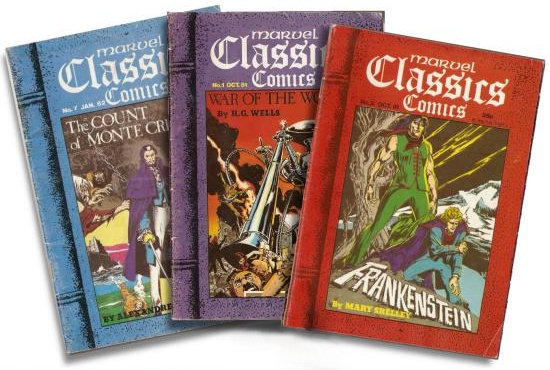
The original plan was to include every possible story: the game engine would be given the rules for creating a story, and famous stories would be seeds for creating new stories. The game would also create people, worlds and even galaxies.
I soon realized that was too ambitious. The game would never be finished! So
I tried a different approach.
I decided to use an existing adventure game engine. Sludge
seemed
to be the most flexible. I planned to release the first
game in 2012, featuring 100 stories. That was then revised to a more
sensible "one game at a time" strategy. By April 2007 I had 5000 scenes
in the
game.
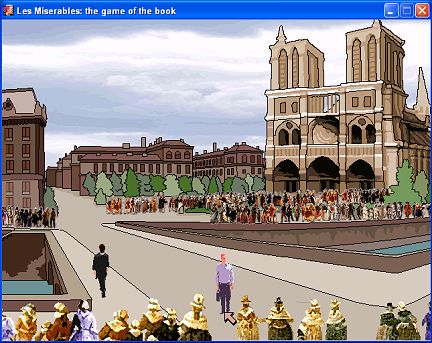
But disaster! In November 2007 I discovered a catastrophic memory leak
in Sludge that could not be fixed before the game was released.
With great regret I had to change game engines. I chose Adventure Game
Studio. It isn't as flexible as Sludge, so I had to start again from
scratch. The first story, Les Misérables, was released just
before
midnight on December 31st, 2008.
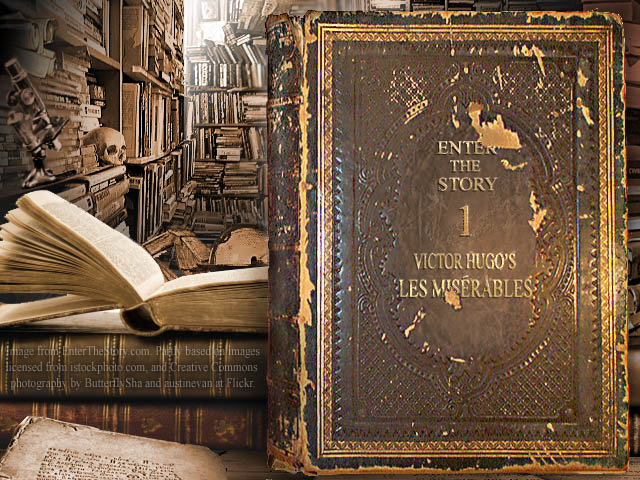
Les Misérables was well received, so I decided to take a risk and
do something completely different. The next games, The Divine
Comedy and Genesis of the Gods (Hesiod's Theogony) were based on stories
from before novels were invented. They have no dramatic
structure, so I focused on the philosophy and ideas.
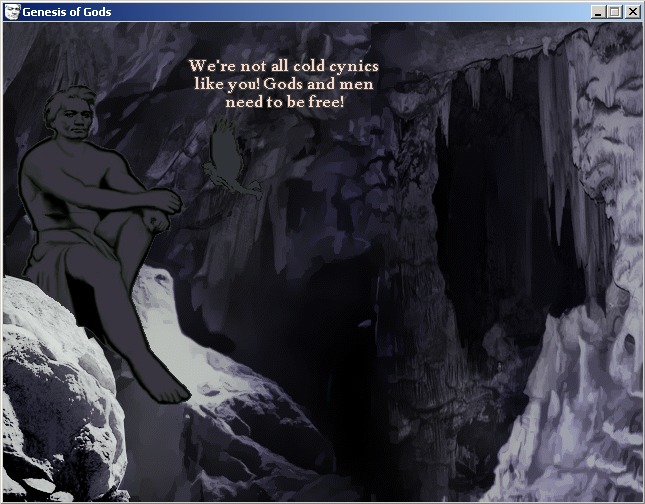
The
experiment was interesting, but players didn't like it. Back
to novels then!
Game 4, A Tale of Two Cities, was released in June
2010. It saw many new characters and many behind the scenes coding
changes.
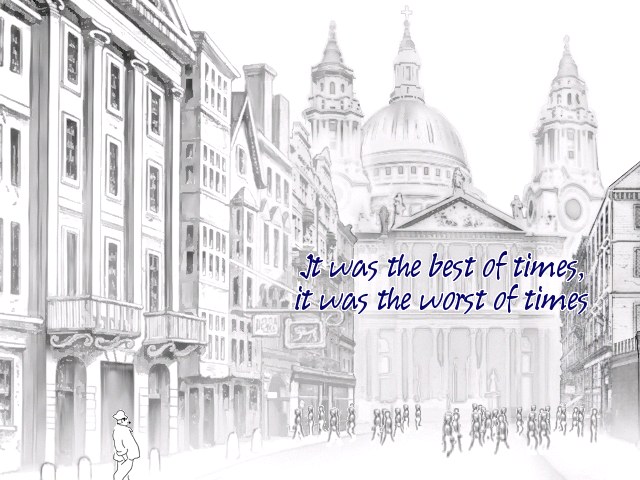
There were further changes in game 5, The Count of Monte
Cristo, released early 2011.
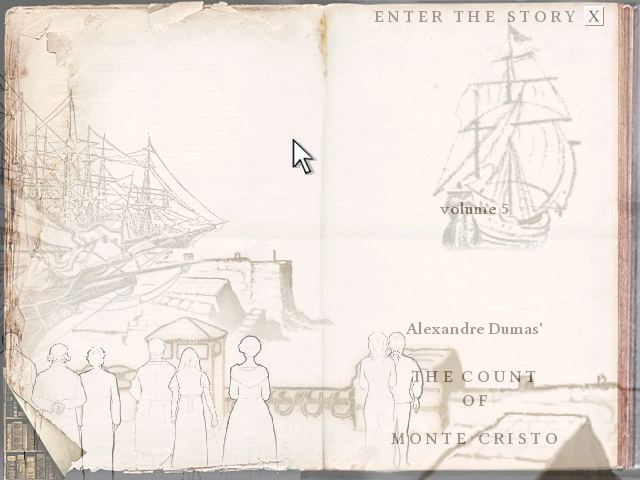
Although development was now streamlined, two facts were now
obvious:
1. I was spending far too much time on coding.
This fact would
never change. Every game brought more user feedback and unexpected new
challenges. I always spent too much time on the code and not
enough time on the stories.
2. Everyone told me that the game was best suited to a tablet computer,
such as the iPad.
But it only ran on Windows! Also, I didn't like how
the game could only be played after a large download. I want it to
play instantly!
So I decided to create a new, simpler game engine that would run on anything.
This was the first test version, but it didn't feel right.
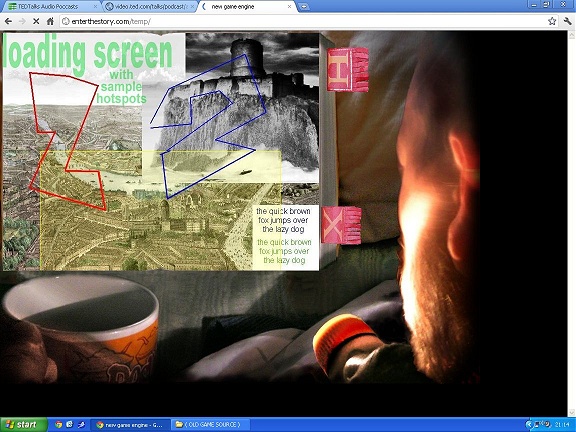
This is the second attempt. It still didn't feel right:
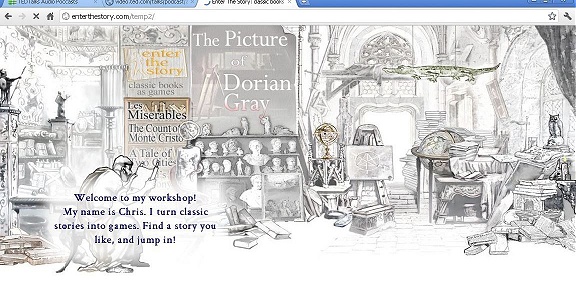
The third attempt felt better. It looks nicer, and worked on all
the main browsers (Chrome, Firefox, Opera, etc.). You could just visit
the web site and play instantly, with more than fifty locations
and hundreds of animated characters (now in full color).
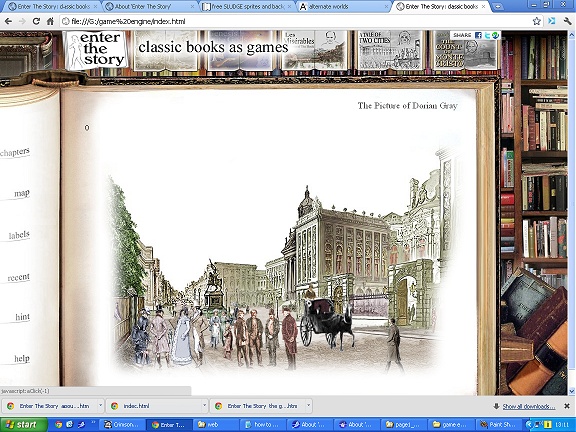
There was
just one problem: the most popular browser is Internet Explorer, and it
was not designed for animation. There were speed problems, memory
leaks, and strange incompatibilities everywhere.
Each problem could be solved, but it always took weeks, and then some
new problem would arise. The code was too complicated again. I want to
write stories, not code! And nobody else makes a game engine that is
suitable (long story).
I needed a complete rethink. None of the games turned out quite how I
wanted. Don't get me wrong, they're good games, but they're not what I
wanted. In fact, I'm not really interested in games at all. The only game I ever really enjoyed was Zak McKracken (that's my site, the Zak McKracken archive).
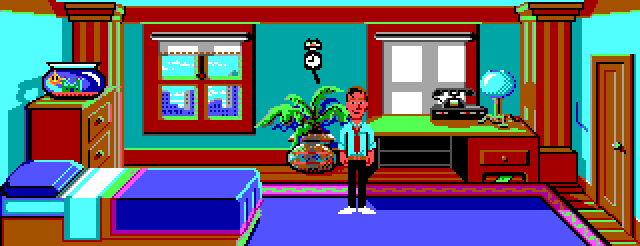
it was based in the real world, and full of real world ideas. The
puzzles didn't interest me, and the simple graphics were no problem: I
just wanted to explore. I love to explore. I read books to explore!
So I got thinking.
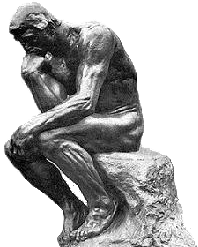
What exactly am I trying to do? Make
games? No! I am not really interested in games. I am interested in
stories. I want to explore stories. Lots of stories! I want hundreds
of stories! And I want to feel like I am really there, involved, free to
go where I want, making all the decisions myself.
Finally it hit me. I should completely remove all the complicated
code, and strip the games down to their core: stories and decisions.
That is all. Stories and decisions. You, the player, spend all your time
making interesting decisions, and I, the game maker, spend all my time
adding stories.
As an added bonus, the new simpler game engine works on almost
anything: a desktop computer, laptop, a tablet, a phone, even an
e-reader, which seems appropriate since this is all about books.
Best of all, I can add a new story every month - perhaps even every
week. The idea is simple, the code is simple, and it just might work!
I hope you like it.
Thanks for reading.
